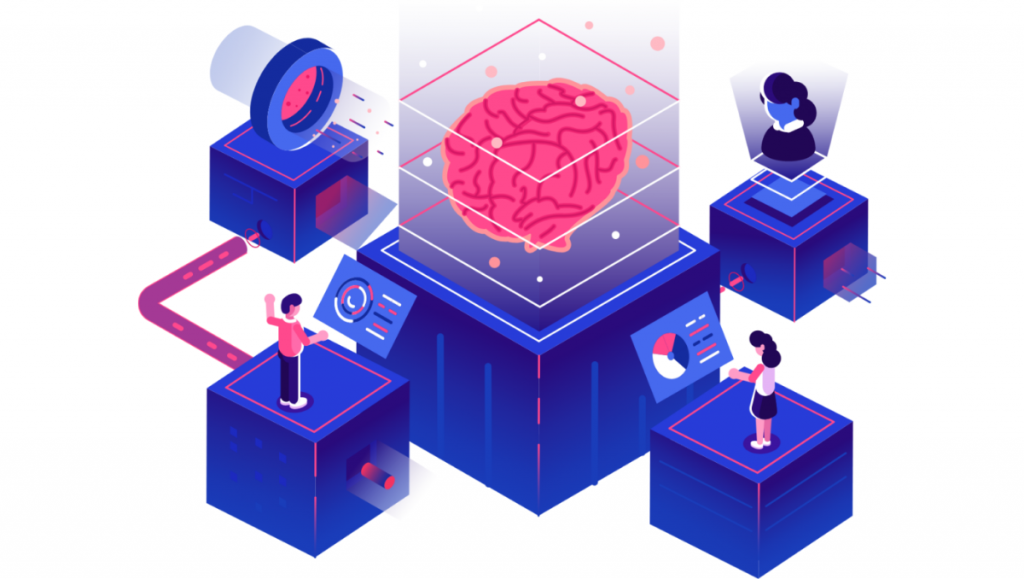Table of Contents
Not many people will be able to provide a more or less clear definition of a term “data science team”. That is because it appeared not so long ago and was used not frequently. However, the need for data science teams grows and many businesses tend to hire them to build complex projects powered by the latest technologies. So if you still do not know what data science teams do, but you have a business that requires software optimization – then this article is for you.
We are going to explain what kind of job data science team performs, what members it includes, what their roles and responsibilities are, and how businesses can benefit from hiring such a team. So, without further ado, let’s proceed to this topic and make everything clear.
What is a data science team?
Basically the data science team is responsible for developing and delivering holistic projects. It has an understanding and vast experience in complex system analysis, software engineering, and data management. And to deliver the solution they use data science.
Usually such a team consists not only of software engineers, but also of a range of other specialists like Business Analysts, Data Architects, Chief Data Officers, and Chief Analytics Officers. They all work together upon a new project from the very beginning and up till its release and maintenance phase.
We’ve already mentioned that data science teams work with complex innovative technologies and it’s reasonable to say that we will discuss all nuances regarding the teams that work with two particular ones – machine learning and Big Data. They both are extremely popular right now and are used to create numerous smart solutions for different businesses. So when working with machine learning and Big Data, the software development companies need specialists who are responsible for the following:
- Dataset preparation;
- Model training;
- Creation of user interfaces;
- Preparation of infrastructure for model deployment;
- Working with all necessary tools and libraries, and many more.
So it is necessary to make sure that specialists have not only mastered the technology but know how to apply it and create a sophisticated solution.
What are the main job roles in the data science team?
Data science team consists of many specialists and it is hard to imagine what’s going to happen if you exclude at least one of them. The Director of Data Science at Stitch Fix Michael Hochster divides all data science specialists into two large categories:
Data science teams need specialists of both kinds who make it possible to develop a solution of any complexity from scratch. And now let’s take a closer look at all crucial job roles and describe what main task every specialist performs.
#1 CDO & CAO
The abbreviations mentioned above are used to identify two specialists of the data science team – Chief Data Officer and Chief Analytics Officer. These jobs are being separated, however most of the time one person performs the holistic work related to those jobs. The main responsibility of CDO and CAO is data and business analytics. They are examining all data and make it comprehensible by highlighting the insights. They also can perform data management and data strategy creation.
Let’s say you have a business and need a solution built with machine learning technology. CDO and CAO will be the ones who can align machine learning with your business needs and goals, they will help to advocate the change, and influence building of your business IT structure. These tasks definitely require a certain set of skills. So here is what every CDO and CAO should be:
- Visionary with deep data analytics and science skills;
- Knowledgeable with an expertise in domain field;
- With certain programming skills.
#2 Data Analyst

The main task of Data Analyst is to collect and interpret information. This specialist will make sure that the collected data is accurate and relevant, and will easily interpret the analytics results. In some huge companies (one of such is HP) it is crucial that data analysts should possess visualization skills and be able to use them to convert all given numbers into graphics.
As to the requirements, it is preferable for all data analysts to have critical thinking, data visualization skills and experience in data presentation.
#3 Data Scientist
This specialist has a vast knowledge of data science, knows how to apply it in practice, can solve complex data-related problems, and is able to find out what problems need to be solved and in what way. Data scientists are involved in developing machine learning models, algorithms and computer science. The complete lifecycle of model development is also a crucial knowledge that every data scientist should have.
Although this job role may seem very complex and related to a narrow field, it should be mentioned that data scientists also can analyze market and customer trends, use reporting tools to discover and highlight certain patterns and relations between data sets.
Data scientists should not only be knowledgeable, but also possess impressive computing skills.
#4 Business Analyst
This job role is crucial because it performs a number of activities to discover the advantages of a business, the things that make it special and competitive and the software that is needed to make the business even better and more profitable. Business Analysts work with loads of data, assess crucial business processes, determine key needs and requirements, make data-driven decisions and recommendations, and provide complex reports based on their research.
Business Analysts help businesses to identify and understand how the new software will influence and improve their company and its productivity level. They also help to mitigate the development risks and define a balanced prie for a required software, select the best feature set and the technology stack that is needed to build a solution.
#5 Machine Learning Engineer
This job role combines machine modeling skills with software engineering. Thanks to Machine Learning Engineers the development team knows what model should be used and what data it requires. Also ML engineers know how to work with statistics and probabilities. They can train, maintain and monitor each model carefully and improve it if needed.
The main skills Machine Learning Engineers should have are computer science, data modelling, programming languages, probability and evaluation techniques.
#6 Data Architect & Data Engineer
Both of these specialists work upon one goal – to make a concept, visualization and then build a complex data management framework. Data Architect and Data Engineer are able to work with extremely huge loads of data which is great, because the company that has such specialists is able to provide Big Data solutions. They can structure the data, define its architecture, centralize the data and organize numerous databases or the unite one.
They both should be aware of and use on practice modern database technologies, programming languages and frameworks, and visualization platforms.
#7 Data Visualization Engineer
This job role may be optional since we’ve mentioned above that visualization can be performed by other specialists like data architect or data analyst. However, some companies prefer to delegate the visualization task especially to Data Visualization Engineers since this is their main focus and the results can turn out better and more accurate. This specialist needs to have understanding of UI development, basic design principles (user-oriented and graphical), and to be able to create custom visualization elements.
Among the skill set of Data Visualization Engineer there are such skills as knowledge of various visualization methods and approaches, understanding of design fundamentals, ability to create and work with charts and tables including different graphic elements.
Skill set that specialists of data science team need
| Job Role | Tech Stack | Platforms |
| Data Analyst | R, Python, JavaScript, C/C++, SQL | Data visualization tools |
| Data Scientist | R, SAS, Python, Matlab, SQL, noSQL, Hive, Pig, Hadoop, Spark, Scala, Perl | Cloud platforms – AWS, Microsoft Azure etc. + Big data platforms & tools – Seahorse, JupyterLab, TensorFlow and MapReduce |
| Data Architect | RESTful services, Spark, Python, Hive, Kafka, and CSS | Database technologies: PostgreSQL, MapReduce, MongoDB + visualization platforms Tableau, Spotfire etc. |
| ML Engineer | R, Python, Scala, Julia, Java | Data modeling tools |
To conclude
These days every business needs reliable software to stay productive and competitive. And if you require a really smart tool, then it is always better to hire a team that will offer you a full cycle development and advanced approach to data science and management.
Such a team should have a range of specialists starting with CDO and CAO and ending with Business Analysts and Data Visualization Engineers, who will be responsible for data collection, interpretation, structuring and visualization. Also they will be able to create data models and provide a smart solution that fits your business needs perfectly.



